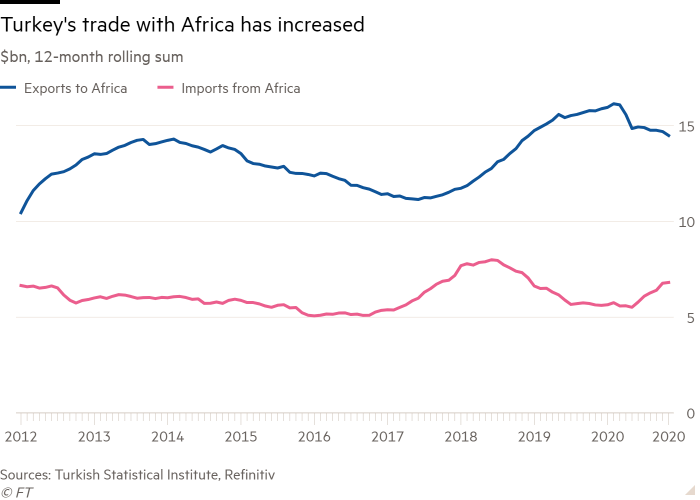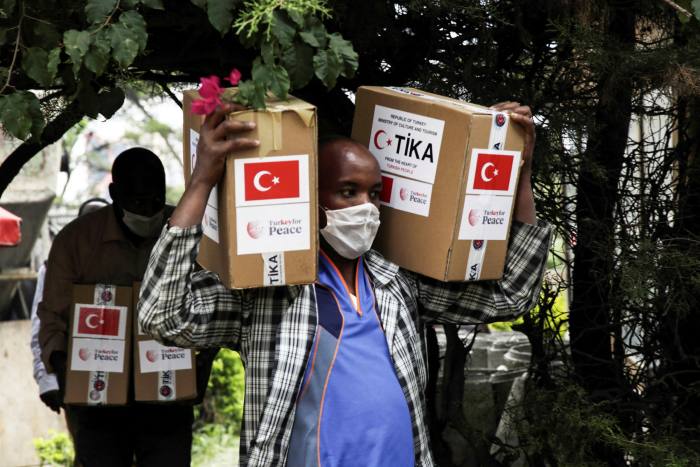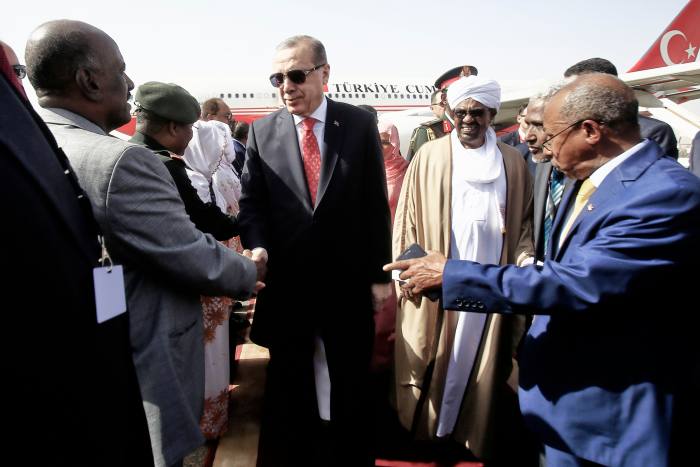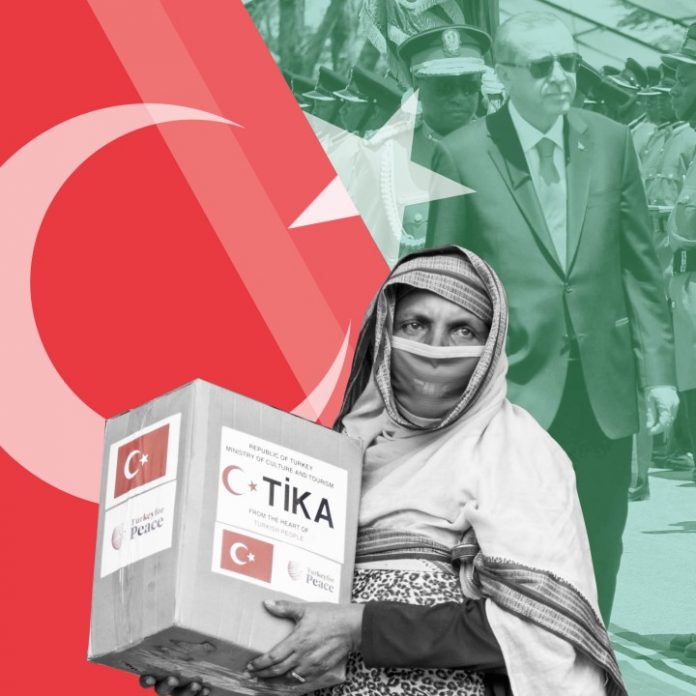President cements foreign policy ambitions with business and humanitarian help on the continent
In a hotel bar in Addis Ababa, an Ethiopian couple wrestle with the remote control, flipping between US election results on CNN, war reports on a local newscast, and a Turkish soap opera, Adi Mutluluk (It’s Called Happiness).
In the end, they choose the Turkish drama, dubbed into Amharic. “The truth is, we both love this show,” the couple echoed.
The success of Turkish television shows in Ethiopia, the powerhouse of the Horn of Africa, is a small but telling sign of Ankara’s growing influence in a region that has become a magnet for foreign capitals. Efforts at soft power, experts say, are aimed at countering the influence of Gulf rivals such as Saudi Arabia and the United Arab Emirates (UAE), as well as the US, France, China and Russia.

Turkish content has been a “consistent big hit”, said Elias Schulze, co-founder, alongside three Ethiopians, of Kana Television, a private satellite channel. For Ankara, trade, development aid and even soap operas have been instrumental in cementing Turkish influence on the continent.
“Turkey has these soft power advantages that it can exploit,” said Michael Tanchum, an expert on Turkish foreign policy at Spain’s University of Navarra.
Pivot to Africa
In the decades that followed the collapse of the Ottoman Empire, Turkey largely ignored Africa, its rulers choosing instead to focus on Europe. Yet, over the past 15 years, Turkey’s president Recep Tayyip Erdogan has spearheaded a revival of ties with the continent. Since 2009, Turkey has increased the number of embassies in Africa from 12 to 42 and Mr Erdogan has been a frequent visitor, chalking up trips to more than 20 capitals.
Turks and Africans were “destined to be partners”, Mr Erdogan said in October. He has set a goal of doubling Turkey’s trade volume with Africa to $50bn in the coming years, roughly a third of its current trade with the EU.
Ankara’s focus on big state infrastructure deals and contracts across Africa — from an Olympic pool in Senegal to its biggest overseas military facility in Somalia and a large mosque in Djibouti — underlines the economic and geopolitical importance it attaches to the continent.

In north Africa, Turkey has been involved militarily, providing support for the UN-backed administration in Libya. A year ago, Mr Erdogan — named person of the year by an influential Senegalese non-governmental body — visited Senegal, riling France, the former colonial power. “Former French colonial African countries are looking for alternatives to France. They don’t want to trade being a French neo-colony for being a Chinese neo-colony. Turkey provides a third way,” said Mr Tanchum. In the Horn of Africa, Turkey and its ally Qatar have been pitched against the UAE, Saudi Arabia and Egypt in a regional power struggle that centres on trade and influence.
“Erdogan sees it’s about time Turkey projects power beyond its borders — and what better place than the Horn where everyone worth their name is claiming real estate,” said Abdullahi Halakhe, an expert on the Horn of Africa. “And they’re doing much better than the rest in putting their money where their mouth is.”
‘Door to the continent’
Turkey’s Africa policy centres on the idea that the continent “had not been paid enough attention, that there was huge potential here for humanitarian and development efforts, first of all, and then also for economic ties, of course”, said Yaprak Alp, Turkey’s ambassador to Ethiopia.
Ethiopia is Africa’s second-most populous country and the big prize for powers tussling in the Horn of Africa, a region to which the Ottomans sent regular naval missions in the 16th century. It is the “door to the continent”, said Ms Alp. Over the past two decades, Turkey has been an important partner to Ethiopia, the third-biggest investor of operational capital in the African country after China and Saudi Arabia, according to the Ethiopian Investment Commission.
Turkish investors, escaping economic woes at home, have been lured by Ethiopia’s economic boom, with growth averaging 10 per cent from 2005 until recent economic and political setbacks. Since coming to power in 2018, Abiy Ahmed, prime minister of Ethiopia, has sought to push through liberal economic reforms — including privatisations.

Out of a total of $6bn already invested by Turkish companies in sub-Saharan Africa, $2.5bn has gone to Ethiopia, said Turkish officials. In 2005, there were just three Turkish companies in Ethiopia. Today, there are 200, ranging from wires and textiles to beverages. Even the eruption of the conflict in the region of Tigray has not deterred Turkish investors.
Simge Yuksel Ozyigit, vice-president of a steel cable producer, Demes Cable, that established a new $45m factory near Addis Ababa last year, said that production had been “normal”, unaffected by the fighting. Cuneyt Coke, chair of the Turkey-Ethiopia business council of the Turkish trade group DEIK, said Turkish businesses remained ready to invest in agriculture, health and energy. “Whoever is well prepared will benefit,” he added.
Friction
For Ankara, the fact that Addis Ababa is home to the African Union carries weight. “It has symbolic value,” said Mr Halakhe. Moreover, Turkey is unwilling to lose another regional ally after the 2019 ousting of the Sudanese leader Omar al-Bashir, who was close to Ankara.
But Mr Abiy enjoys support from Turkey’s rivals, the UAE and Saudi Arabia, which helped it negotiate peace with Eritrea. And there has been friction between Mr Abiy and Mr Erdogan, both strong-minded leaders with clear visions, according to a former diplomat.
Still, Turkey’s support for Ethiopia in its dispute with Egypt over the Grand Ethiopian Renaissance Dam has boosted the friendship between both countries. Last October, Addis Ababa slammed Donald Trump for “incitement of war” between Ethiopia and Egypt, after the US president said Egypt would “blow up” the dam. “We want African solutions for African problems,” said an Ethiopian official, adding that Turkey, unlike other powers, “understands” that.

Turkey also sustains a presence in Somalia, where it has built roads and established a large military training camp. Last year, a Turkish company signed a 14-year contract to revamp and operate a port in Mogadishu. Ankara has been a major source of aid to the country, pouring in more than $1bn since 2011, and, in early November, it paid off $2.4m in debts owed by Somalia to the IMF. It has built hospitals, schools and provided scholarships. Such was the largesse that some parents named their baby boys Erdogan. Abdulkadir Mohamed Nur, Somalia’s justice minister, offered his “heartfelt gratitude” to Mr Erdogan “for his continued support to Somalia”.
“Turkey is clearly a big player in Somalia, but mainly it is a very important commercial player in Ethiopia,” said Rashid Abdi, an independent expert on the Horn of Africa. “Ethiopia is a huge, huge, opportunity for Turkey because it’s a big market, it is a vibrant economy. So, this is the right frontier for Erdogan. It is clearly the target for the Turks to win Ethiopia.”
Beaming out of the television screens, the actors of Adi Mutluluk continue winning Ethiopian hearts at the Addis Ababa lobby bar — with chambermaids now joining in. “They’re addictive. I think we’ve learned how to make them addictive,” said Ms Alp, Turkey’s ambassador to Addis Ababa, referring to Turkish dramas. “This is also the case for Ethiopians who tell me we are so similar that they recognise themselves in them culturally.”
Source: Financial Times
This is the last part of a series exploring Turkey’s geopolitical ambitions. Previous instalments include Erdogan’s great game: Soldiers, spies and Turkey’s quest for power, Erdogan’s great game: The Turkish problem on the EU’s doorstep and Erdogan’s great game: Turkish intrigue in the Balkans.































